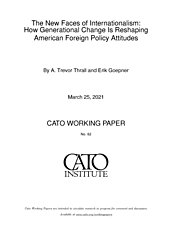Observers of American foreign policy have been worried for years about eroding public support for international engagement, especially in light of increasing public discontent after nearly two decades of military conflict since 9/11. Low support for international engagement and military intervention among younger Americans, in particular, has led some to worry that the age of American internationalism has passed. There is little agreement, however, about how serious the erosion of public support is and what its causes are.
Relying on an analysis of seven decades of polling data, we argue that generational effects have slowly reshaped patterns of American foreign policy preferences. Since World War II, Americans have come of age during periods increasingly less conducive to support of military intervention, leading them to adopt worldviews increasingly at odds with those carried by older Americans. As a result, the United States is undergoing a slow motion changing of the guard, as older and more hawkish Americans die and are replaced by younger, less hawkish ones.
These findings have important implications for the debate about the state of public support for American leadership of the liberal international order and the evolution of American foreign policy.



